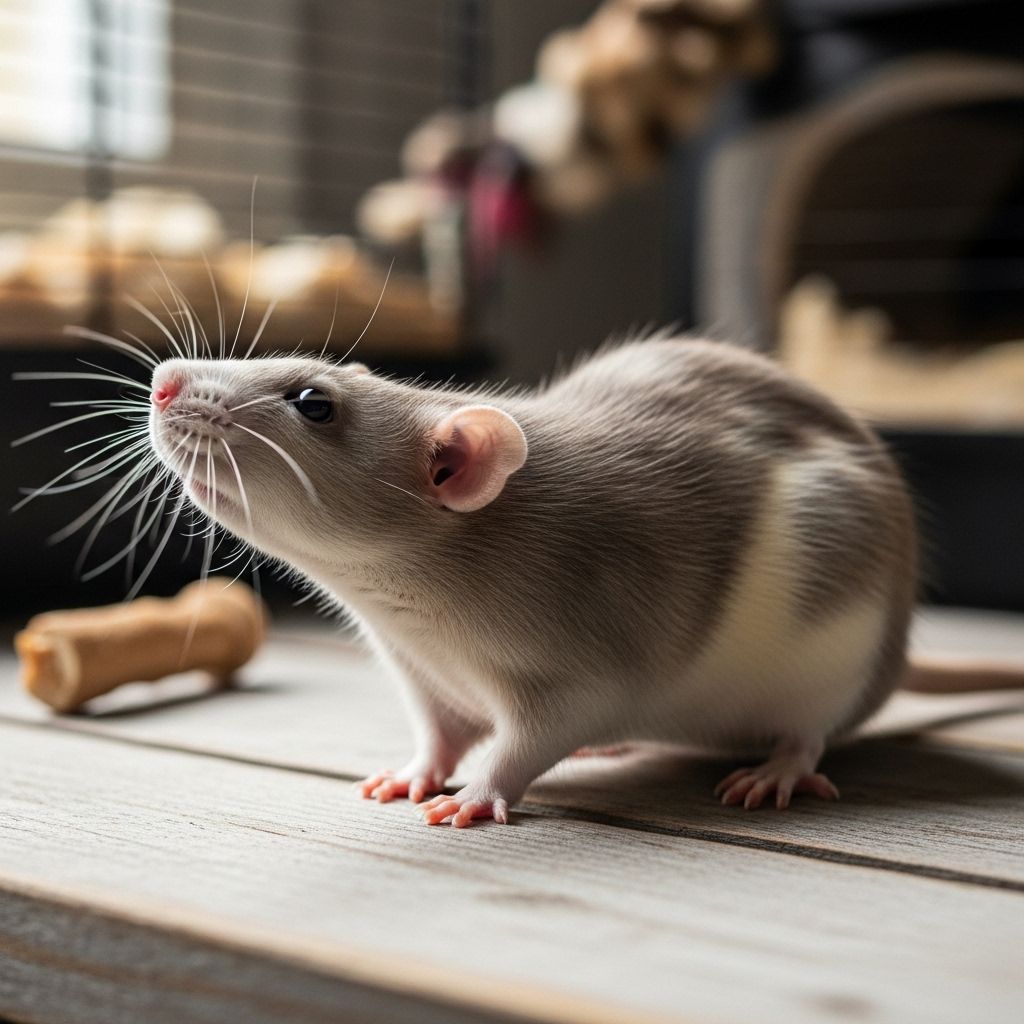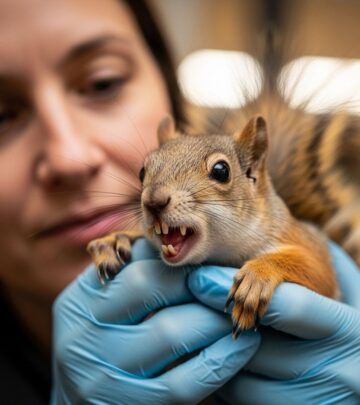Pet Rat Lifespan: Key Insights For Longevity And Care
Discover the average lifespan of pet rats, what affects their longevity, and practical care tips to help your rat live its healthiest life.

Image: HearthJunction Design Team
How Long Do Rats Live?
Rats are intelligent, affectionate, and sociable small mammals that make popular pets for both adults and children. Understanding the typical lifespan of a pet rat and the many factors that influence their longevity is essential for any prospective or current rat owner. This article covers the average rat lifespan, the key variables that impact their longevity, care guidance, and answers to common questions.
Average Lifespan of a Pet Rat
The typical lifespan for a domesticated pet rat is about 2 to 3 years when cared for properly. Some rats may live slightly longer with ideal care, but exceeding three years is uncommon. In comparison, wild rats often have significantly shorter lives, rarely surpassing a year due to predators, disease, and harsh environmental factors.
- Pet rats (domesticated): 2-3 years
- Wild rats: Several months to 1 year
- Record lifespans: Some rare individuals may live 3-4 years, but this is exceptional
Why Is the Rat Lifespan So Short?
Despite their size, rats have fast metabolisms and rapid heartbeats, contributing to their relatively short lives. Even with optimal care, rats age quickly and usually develop age-related health issues during their short adulthood.
Factors That Affect Pet Rat Lifespan
Not all rats live to the same age. Multiple variables play a role in determining how long an individual rat will thrive. Here are some primary influences:
- Genetics: Some rats are genetically predisposed to longer or shorter lives. Responsible breeding can help extend average longevity, but inbreeding or poor genetic stock may lead to health problems.
- Diet: A balanced, nutritious diet rich in fresh vegetables, quality rat pellets, and occasional healthy treats keeps rats healthy and wards off disease.
- Habitat: Clean cages, fresh bedding, and enrichment items (like tunnels and toys) are crucial. Rats living in unsanitary conditions are at higher risk for respiratory and other illnesses.
- Veterinary Care: Preventative checkups, prompt attention for illness, and spaying or neutering when needed can increase a rat’s lifespan.
- Socialization: Rats are social animals. Loneliness and isolation can lead to stress and health decline, so keeping rats in same-sex pairs or groups is recommended.
- Spaying/Neutering: Neutered or spayed rats often live longer due to a reduced risk of certain cancers and reproductive diseases.
Typical Health Concerns in Rats
Rats are prone to a variety of health issues, especially as they get older. Recognizing the signs early and seeking veterinary help can make a significant difference in longevity and quality of life.
- Respiratory infections: Rats have sensitive respiratory systems.
- Tumors: Both benign and malignant tumors are common, particularly mammary tumors in females.
- Obesity: Overfeeding or an imbalanced diet can cause weight gain and associated health problems.
- Parasites: External (mites, lice) and internal (worms) parasites are possible but preventable with good hygiene and routine care.
- Dental issues: Rats’ teeth grow continuously and require chewing material to naturally wear down.
Table: Common Rat Health Issues and Prevention
| Health Issue | Frequency | Preventive Measures |
|---|---|---|
| Respiratory Infections | Very Common | Clean bedding, proper ventilation, avoid drafts |
| Tumors (especially mammary) | Common in older rats | Spaying females, regular vet checks |
| Obesity | Occasional | Balanced diet, exercise, avoid fatty treats |
| Parasites | Occasional | Clean habitat, fresh bedding, routine inspection |
| Dental Problems | Occasional | Chew toys, varied diet |
How to Extend Your Rat’s Life Expectancy
While you can’t change your pet’s genetics, there are several important ways you can help your rat live the longest, healthiest life possible:
- Feed a Proper Diet: Choose quality commercial rat pellets, supplemented with fresh fruits and vegetables. Avoid sugary, fatty, or human snack foods.
- Keep the Cage Clean: Spot-clean bedding daily, replace soiled material, and wash the cage thoroughly at least once a week.
- Provide Enrichment: Rats need mental and physical stimulation, so supply tunnels, climbing toys, and gnawing materials.
- Arrange Regular Veterinary Visits: Yearly health checks help catch issues early. Ask your vet about vaccinations, parasite control, and dental care.
- Social Housing: Keep rats in compatible groups to prevent loneliness and stress.
- Handle Gently and Regularly: Daily interaction strengthens your bond and helps detect health changes.
How Genetics, Sex, and Types of Pet Rats Affect Longevity
Genetics play a key role in how long a rat lives. Selective breeding for longevity is still relatively new among pet rat breeders, so lifespan can vary widely even among siblings. Some specific types or breeds of rats may also experience differences in lifespan:
- Standard Rats: These are the most common variety, with short, glossy coats. Their lifespan falls in the typical 2-3 year range.
- Rex Rats: Known for curly whiskers and coats, but with no proven difference in average lifespan.
- Dumbo Rats: Named for large, rounded ears; their life expectancy is similar to other rat types.
- Hairless Rats: More sensitive to temperature and skin infections, potentially leading to a slightly shorter lifespan.
Sex also has a role. Female rats may be prone to reproductive tract tumors as they age; spaying is often recommended if you want to minimize this risk.
The Life Stages of a Pet Rat
Understanding how rats mature and age can help you provide the best care throughout their lives:
- Baby (Kitten/Pup): Birth to 3 weeks. Fully weaned and independent by 4-5 weeks.
- Juvenile: 1–3 months. Rapid growth, learning, very energetic.
- Adult: 3–18 months. Prime physical condition, playful, social, and curious.
- Senior: 18–36 months. May develop age-related health issues, reduced activity, increased need for care.
Rats show signs of aging around 18 months, with a gradual slowing down, graying fur, and increased risk for illness.
Choosing a Healthy Rat
Whether adopting from a shelter or selecting from a breeder, here’s how to pick a rat likely to live a long, robust life:
- Look for active, alert, and curious individuals
- Check fur for cleanliness and skin for sores
- Eyes and nose should be clear, with no discharge
- Teeth should be aligned and not overgrown
- Ask about family health history, if possible
Rat Lifespan Compared to Other Small Pets
| Pet Species | Average Lifespan (years) |
|---|---|
| Mouse | 1–3 |
| Rat | 2–3 |
| Hamster | 2–3 |
| Guinea Pig | 4–8 |
| Rabbit | 5–12 (breed-dependent) |
| Ferret | 6–9 |
FAQs about Rat Lifespan and Care
How can I help my rat live longer?
Feed a high-quality, balanced diet, provide a clean and enriched habitat, offer plenty of socialization, and schedule regular vet visits. Spaying or neutering can reduce cancer risk.
How do I know if my rat is aging?
Signs of aging include slower movement, graying fur, weight loss or gain, appearance of lumps, and reduced curiosity. Elderly rats need soft bedding and extra care.
Can rats and mice live together?
No, rats and mice have different social structures and requirements. Rats may harm or eat mice, so they should always be housed separately.
Are certain rat breeds longer-lived than others?
While no breed is proven to live significantly longer, rats from responsible breeders focusing on health and longevity may live longer on average than those from pet stores or breeders who don’t prioritize genetics.
Should I keep more than one rat?
Yes. Rats are extremely social and need the company of other rats. Solo rats are more likely to become stressed, depressed, or sick.
Conclusion
Rats make delightful, intelligent, and social pets, but their relatively short lifespan means owners must be prepared for the inevitable goodbyes after a few years. By understanding their needs, providing excellent care, and choosing healthy individuals, you can ensure your rat enjoys a full, happy, and healthy life. If you’re considering a pet rat, remember the time commitment, but also the potential for a rewarding bond over their brief but memorable lives.
References
Read full bio of Anjali Sayee












